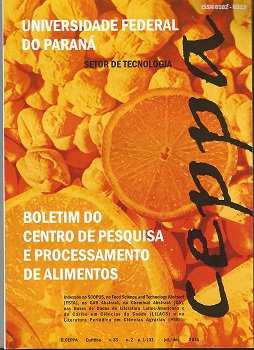EFFECT OF PASTEURIZATION CLAIM ON ACCEPTANCE AND PURCHASE INTENTION OF READY-TO-EAT AÇAÍ
DOI:
https://doi.org/10.5380/cep.v33i2.47297Resumo
The açaí (Euterpe oleracea) is very perishable, due to its microbial,
chemical and enzymatic nature. Furthermore, extensive handling
of the product during the production process also contributes to
its rapid deterioration and contamination. Results showed the açaí
as a vehicle for oral transmission of Acute Chagas disease (ACD).
The pasteurization, which is an important thermal process in the
food industry, can inactivate the protozoan that transmits the ACD,
assuring microbiological food safety. However, heat can aff ect
important sensory characteristics such as color and fl avor and
decrease açaí acceptance. On the other hand, information about
the product can interfere in the consumer’s choice and intention to
purchase. The study was conducted with two brands of ready-toeat
açaí, pasteurized and unpasteurized. Aff ective acceptance tests
were performed with the samples, using the hedonic 9-point scale (1
= dislike extremely to 9 = like extremely). Moreover, evaluations also
included consumption frequency , and purchase intention. Results
demonstrated that the pasteurization claim, given to consumers,
increased (p<0.05) acceptance of the pasteurized sample (7.5a),
initially (without the claim) (6.2b) not as well accepted as the
unpasteurized sample (7.8a) (p<0.05). Despite that, the claim of not
pasteurization did not infl uence the acceptance of the unpasteurized
sample (7.8a), which remained well accepted (p>0.05) by consumers
(7.8a). These results reinforce the importance of the eff ect of
information on the consumer’s acceptance and purchase intention
of açaí.
Downloads
Publicado
Como Citar
Edição
Seção
Licença
Copyright for articles published in this magazine belongs to the author, with first publication rights for the magazine. By virtue of appearing in this public access magazine, the articles are free to use, with their own attributions, in educational and non-commercial applications.




